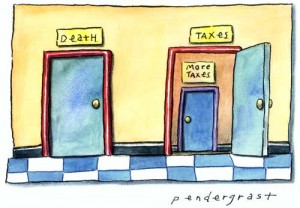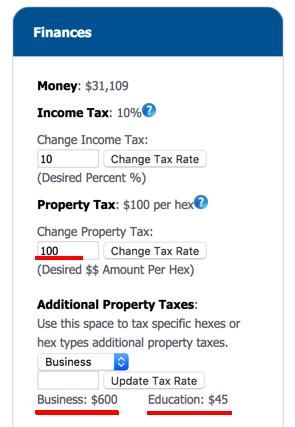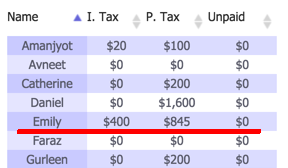 The Civic Mirror simulation has always included basic income and property tax features. In other words, when a student from a CM class becomes the President or Prime Minister of their simulated country and are given access to the Government Account, they have the ability to set their nation’s tax rates based on what’s decided in their Mock Congress or Mock Parliament events. This creates in-class debate and controversy amongst students because they have competing Hidden Agendas which score points differently depending on what the tax rates are set at.
The Civic Mirror simulation has always included basic income and property tax features. In other words, when a student from a CM class becomes the President or Prime Minister of their simulated country and are given access to the Government Account, they have the ability to set their nation’s tax rates based on what’s decided in their Mock Congress or Mock Parliament events. This creates in-class debate and controversy amongst students because they have competing Hidden Agendas which score points differently depending on what the tax rates are set at.
Take, for example, this discussion between two students in the simulated country “Isla Clementina” from Harpeth Hall School, a girls-only prep school in Nashville, TN:
The laws I am suggesting are-
1. Higher taxes for richer people, lower for poorer people.
2. Most properties are owned by the government- that way, equality will be easy to have.
 Counterargument:
Counterargument:
I think that there should be no taxes at all, because the government all ready has a lot of money. The government also owns the most successful properties in our country.
Now, Specific Types and Kinds of Properties Can Be Taxed Differently
Since CM launched, students could only set a flat property tax rate for all kinds of properties (or hexes). For example, if property tax rates were set at $200, regardless of
- a) type (i.e. business, residential, wilderness) or
- b) kind (e.g. farms, apartments, mansions, etc.),
… All hexes would be taxed $200. This meant that – if governments wanted to tax certain types of hexes more – they would have to manually calculate and collect these additional taxes.
 Starting now, student governments can set specific tax rates and the program will automatically calculate and collect these taxes at the end of a simulated year.
Starting now, student governments can set specific tax rates and the program will automatically calculate and collect these taxes at the end of a simulated year.
Let’s explain with an example. As the image to the right shows, Emily owns an Education hex. This property produces education “units” which she can trade or sell to her classmates. She makes lots of money selling these units, and a left-leaning government sympathetic to the poor people in this country decide to tax business owners more.
Now, using the “Additional Property Taxes” features, Emily’s government can – and has – set three different property tax rates:
 i) Base Property Tax: This has been set at $100. This means that the owners of every hex in the country will be taxed $100 at the end of every simulated year.
i) Base Property Tax: This has been set at $100. This means that the owners of every hex in the country will be taxed $100 at the end of every simulated year.
ii) Hex Type: The government has chosen to tax the owners of every business hex $600 (which gives it a running total of $100 + $600 = $700).
iii) Specific Hex: And the government (in an effort to pressure Emily to sell her hex) has created an additional $45 tax that the owners of Education hexes have to pay (bringing her total property tax bill for her one education hex to $745).
This is so cool because now students will literally be able to focus their taxation debates on certain types of hexes and why. For example, one teacher has told us that his students were debating in the Town Hall whether owners of Mansions should or shouldn’t have to pay additional taxes considering how many more Well-Being Points they score for being able to live in them. This, then, turned into a debate over the U.S. Constitution’s Preamble, where Mansion owners said this tax prevents them from “pursuing happiness.”
 Returning to our example, we can see in the image below that at the end of Emily’s simulated year, she was taxed $745 for her Education hex, and an additional $100 for her Wilderness hex, which did not incur the additional types of taxes.
Returning to our example, we can see in the image below that at the end of Emily’s simulated year, she was taxed $745 for her Education hex, and an additional $100 for her Wilderness hex, which did not incur the additional types of taxes.
